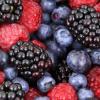I just found this patent: https://patents.goog.../US7344867B2/en
If I'm reading it correctly, the experiments described indicate that 55730 (the parent of 17938) is pro-inflammatory, leading to increased TNFα production in vitro:
Incubation of THP-1 cells with 24-hour L-CM from L. reuteri ATCC PTA 4659, L. reuteri ATCC PTA 6475 strains in the absence of LPS did not lead to the generation of TNFα in the incubation medium (FIG. 1). Surprisingly, L-CM from L. reuteri ATCC 55730 and L. reuteri strain CF48-3A stimulated the production of TNFα by the THP-1 cells to levels similar to those seen with LPS alone. Thus, the L. reuteri strains differ in their ability to stimulate pro-inflammatory TNFα production by resting THP-1 monocytes.
Addition of LPS to the THP-1 cells in the absence of L-CM led to the generation of 138 pg/ml TNFα during the 3.5 hour incubation period. This is the expected inflammatory response of the THP-1 cells to the toxin. Addition of the growth medium (MRS), which acts as a control for the L-CM additions, led to the generation of 132 pg/ml TNFα and thus MRS did not interfere with the response to LPS. The addition of 24-hour L-CM from L. reuteri ATCC PTA 4659 or L. reuteri ATCC PTA 6475 dramatically reduced the levels of LPS stimulated TNFα to only 14 and 10 pg/ml, respectively. This represents an inhibition of LPS-stimulated TNFα production of 89 and 92%, respectively. On the contrary, in the presence of 24-hour L-CM from L. reuteri ATCC 55730 and L. reuteri strain CF48-3A, LPS was still able to induce a significant rise in TNFα compared to the levels in the absence of LPS. LPS-stimulated TNFα production increased by 50% and 38% despite the presence of L-CM from L. reuteri ATCC 55730 and L. reuteri strain CF48-3A, respectively.
Similar experiments performed with 9-hour L-CM from L. reuteri ATCC PTA 4659 or L. reuteri ATCC PTA 6475 demonstrated that the inhibitory effect on LPS-stimulated TNFα production was considerably less (52% and 16%, respectively; FIG. 2) but still there. Thus, longer incubations of the L. reuteri strains, with harvesting of the L-CM in late log/stationary phase of growth, leads to improved efficacy in inhibiting TNFα production.
.....................................................
Compared to medium controls, the production of TNFα in response to LPS in differentiated macrophages derived from primary monocytes from CD-act patients, was significantly inhibited by 50% by L-CM from L. reuteri ATCC PTA 4659 and by 60% by L-CM from L. reuteri ATCC PTA 6475 (FIG. 4). Confirming the data from the THP-1 cells, L-CM derived from L. reuteri ATCC 55730 and L. reuteri strain CF48-3A were unable to inhibit the production of TNFα and on the contrary, increased the production of TNFα by 22% and 30%, respectively compared to the relevant controls
Assuming that the genes that were knocked out in creating 17938 from 55730 (genes to do with potential antibiotic resistance) have not altered the above characteristics, I'm really puzzled why BioGaia combined an anti-inflammatory (6475) and a pro-inflammatory (17938) in the same product.
Anyway, it further emphasises the importance of adjusting the culture medium to strongly favour 6475 by any means possible.
Edited by TerryFirmer, 06 August 2018 - 10:53 AM.
![]() The purpose is to show how easily one strain can out compete another one. The only way to tell how it works would be a lab test.
The purpose is to show how easily one strain can out compete another one. The only way to tell how it works would be a lab test.




















































